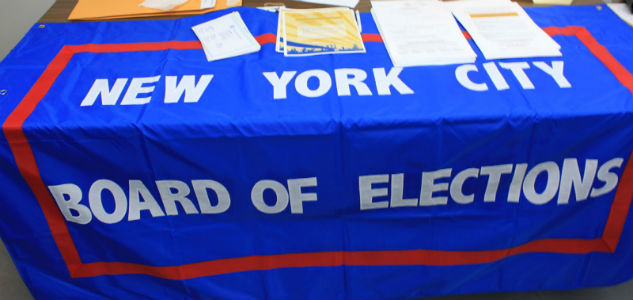
Barriers to entry for independent candidates are exposed by money needed but Eliot Spitzer gets his signatures for candidacy by funding signup form drives
Ballot Access News had the interesting angle on Eliot Spitzer’s five day blitz that helped him get enough signatures to run for NYC Comptroller. The episode is more proof of the power of money in running for election and how having a lot of cash can grease the wheels of the current system. Candidates without the money to pay vast sums find that there are extra barriers to entry. The post, Eliot Spitzer Campaign Paid Petitioners $800 Per Day, speaks for itself:
Eliot Spitzer, seeking the Democratic nomination for New York City Comptroller, needed 3,750 valid signatures of registered Democrats by July 11. Since he started getting signatures only five days before the deadline, his campaign paid petitioners $800 per day. New York state election law forbids paying petitioners on a per-signature basis. See this story, written by a college student who helped collect the signatures. The student reports that he collected over 200 signatures in his two days of work. The Spitzer campaign submitted approximately 27,000 signatures on the deadline.
That article in local paper, the Gothamist, also had some interesting inside information from one of the signature collecting petitioners:
Even if I got someone to sign, there are many many hurdles for a legitimate signature to be accepted by the Board of Elections. A person has to legibly fill out the date; their signature; their full printed name, the first line of their address with the words East, West, Avenue, or Street, all written out; city; zip code; and county. This is not as easy as it sounds. In addition, they have to be registered Democrats, and could not have already signed for Spitzer’s opponent, Scott Stringer. They must live in the five boroughs, and not have a felony conviction. People forget directions, especially when they’re running off to meet friends. Plus, there is very little room to write this information in on the form, so their writing is bound to be messy. To lighten the tension, I joke that the petition is only slightly more complicated than filing for taxes. I mostly get blank looks. Petition humor is hard.
In a recent post, New York Times Story on Difficulty of Getting Signatures for Republican Party Primary Petitions, Richard Winger of Ballot Access News adds a different view on the story:
The New York Times story explains the difficulty of collecting signatures for Republican primary candidates in New York city. With only 470,000 registered Republicans in the city, even mainstream Republicans have difficulty collecting 3,750 valid signatures of party members. As the story says, normal petitioning on the street barely works, and petitioners find they must first get a list of registered Republicans and then try to find them at home. This is why the new legislation in Arizona, HB 3605, is so devastating to Arizona’s minor parties. The bill requires over 5,500 signatures of party members (or registered independents) and the Green Party only has about 6,000 registered members in the state.
Winger also add that both New York state and NYC have a residency requirement for collecting signatures and “only New York residents can circulate petitions.” Also, take a look at this excerpt from the New York Times article as well:
Every mayoral candidate needs 3,750 voter signatures to appear on the primary ballot in September. With about 3 million registered Democrats in the city, Democratic canvassers can stand on a street corner and let the deluge pour forth. It is not so easy for Republicans, whose party counts only about 470,000 registered voters, mostly in enclaves outside Manhattan. Republican hopefuls like Mr. Catsimatidis can be so hard-pressed for signatures that they make individual appointments with registered voters. “You can’t stand outside the supermarket, you can’t stand outside the subway stop, you can’t collect signatures on the street,” said Eric Ulrich, a Republican city councilman from Queens, who said he has had his grandmother, among other volunteers, gather signatures for him. “You literally have to go knocking on doors, door to door, to gain ballot access.”
Leave a Reply